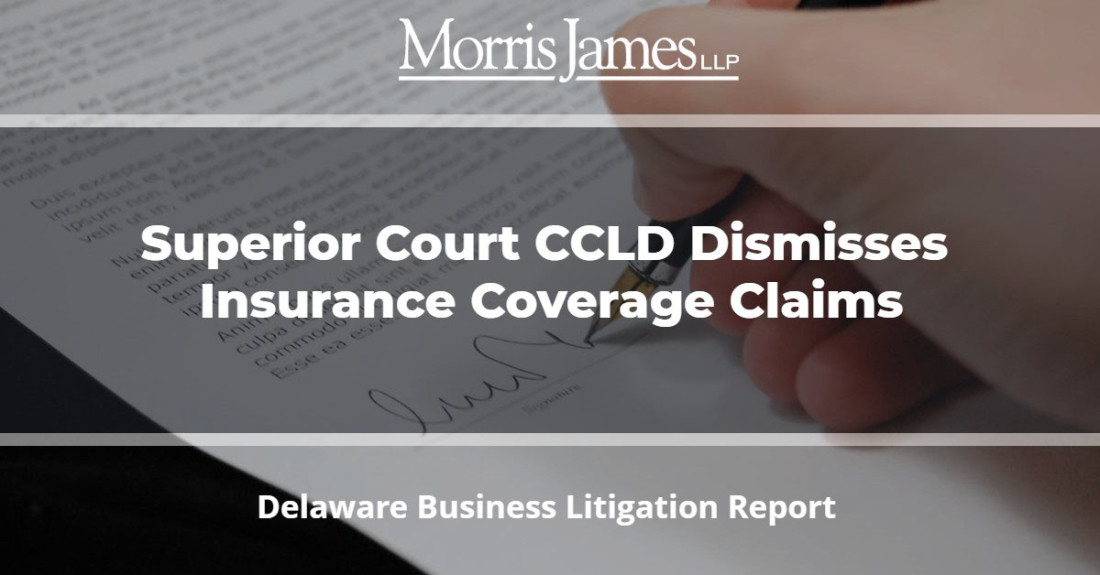The Delaware Superior Court CCLD Dismisses Insurance Coverage Claims Against Non-Resident Defendants but Declines to Stay Litigation Against Delaware Insurers in Favor of Contemporaneously Filed New York Action
AR Capital, LLC et al. v. XL Specialty Insurance Company, et al., C.A. No. N19C-01-024 (MMJ) (CCLD).
 It is axiomatic that in order for a Delaware court to exercise general personal jurisdiction over a defendant, that defendant must either be incorporated or have their principal place of business in Delaware. If there is no general personal jurisdiction, then there must be specific personal jurisdiction. Moreover, under Delaware’s familiar standard in governing whether an action should be stayed in favor of a first-filed action, the Court will review the competing actions to determine whether the actions were contemporaneously filed (and will apply traditional forum non conveniens factors pursuant to General Food Corp. v. Cryo-Maid, Inc., 198 A.2d 681, 684 (Del. 1964)) or whether the foreign action is truly first-filed (thereby applying the standard set forth in McWane Cast Iron Pipe Corp. v. McDowell-Wellman Eng’g Co., 263 A.2d 281 (Del. 1970)). The “contemporaneous” determination is important because if the actions are filed contemporaneously, the movant seeking dismissal has the burden to prove that litigating in Delaware would cause “overwhelming hardship.”
It is axiomatic that in order for a Delaware court to exercise general personal jurisdiction over a defendant, that defendant must either be incorporated or have their principal place of business in Delaware. If there is no general personal jurisdiction, then there must be specific personal jurisdiction. Moreover, under Delaware’s familiar standard in governing whether an action should be stayed in favor of a first-filed action, the Court will review the competing actions to determine whether the actions were contemporaneously filed (and will apply traditional forum non conveniens factors pursuant to General Food Corp. v. Cryo-Maid, Inc., 198 A.2d 681, 684 (Del. 1964)) or whether the foreign action is truly first-filed (thereby applying the standard set forth in McWane Cast Iron Pipe Corp. v. McDowell-Wellman Eng’g Co., 263 A.2d 281 (Del. 1970)). The “contemporaneous” determination is important because if the actions are filed contemporaneously, the movant seeking dismissal has the burden to prove that litigating in Delaware would cause “overwhelming hardship.”
In this action arising out of plaintiffs’ request for coverage under Difference in Conditions (“DIC”) policies and Director and Officer Liability (“D&O”) policies, the Superior Court’s Complex Commercial Litigation Division dismissed four insurance companies from a lawsuit seeking coverage under DIC policies for lack of personal jurisdiction but retained jurisdiction with respect to coverage claims against insurance companies providing D&O coverage pursuant to the Cryo-Maid factors. Plaintiffs conceded the Court did not have general jurisdiction as the DIC defendants were not incorporated or headquartered in Delaware, and the Court determined it did not have specific jurisdiction because the contested conduct did not fall within any one of the six subsections of Delaware’s long-arm statute, 10 Del. C. § 3104(c). Merely being licensed in Delaware when the claims did not arise from any activities transacted in Delaware was not sufficient to sustain jurisdiction. Turning to the D&O defendants’ motion, the Court analyzed two aspects of the forum non conveniens framework (1) the McWane standard controlling first-filed actions and (2) Delaware’s Cryo-Maid factors considered in determining whether to dismiss or stay an action on forum non conveniens grounds. Faced with two actions in different forums, New York and Delaware, filed a day apart, the Court found the actions were filed contemporaneously. Consequently, McWane did not apply and the Cryo-Maid factors controlled. With most factors weighing neutral, the D&O defendants failed to show an overwhelming hardship justifying dismissal under the Cryo-Maid factors, nor could they show that such factors tipped the balance in favor of litigating in the non-Delaware forum. Thus, the Court denied the D&O defendants’ motion to dismiss or stay.
Share

